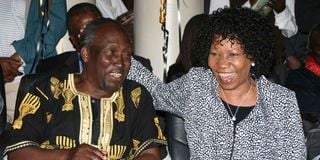Premium
Ngugi wa Thiong’o and Njeeri: ‘Guardian’ lays bare author’s life in America

Better days: Celebrated author, Prof Ngugi wa Thiong'o and his wife Njeeri Thiong'o during the launch of his autobiography titled Dreams in a Time of War; a Childhood Memoir on August 19, 2010, at the Museums of Kenya in Nairobi.
Celebrated Kenyan writer Ngugi wa Thiong’o, the co-author of I Will Marry When I Want, has parted ways with his equally renowned wife Njeeri, a woman he met in the US while in exile.
This was revealed in an interview Prof Ngugi had with the Guardian, a British newspaper, which saw a writer spend three days with the literary icon in October 2022.
“He (Ngugi) and his wife were going through a divorce. Before the two of them separated, they lived in University Hills, a part of Irvine where a lot of university faculty stay, near the [Pacific Ocean] beach,” says the article published online on June 13 this year.
However, not much was revealed in the story about the storm in what for long looked like a perfect marriage between the 85-year-old author and his wife.
At the time the Guardian visited him, Prof Ngugi – who was also battling kidney failure and several other health complications that caused a triple bypass heart surgery in 2019 – lived a life where cleaners and a medic would go to his house, attend to what they needed to attend to, then leave.
The Guardian’s Carey Baraka, the author of the 8,661-word story, was intrigued by this life when he spent time at Prof Ngugi’s residence in the US state of California.
“In Kenyan culture, you do not ask people almost 60 years older than you about their marriages. Ngugi seemed to sense that an explanation of some kind was needed because he said, unprompted, ‘I know I look like a bachelor, but I’m not’,” wrote Baraka, who added that the writer was “living alone, far from the beach, unable to drive”.
Prof Ngugi and Njeeri met in 1989 at the Grand Central Station in New York.
Fled into exile
This was 11 years after the writer had fled into exile after fleeing the thin-skinned government of Kenya’s founding president Jomo Kenyatta that had jailed him for a year without trial as it cracked down on political messaging in art. It was at this period Prof Ngugi had created works of art that included the famous play Ngaahika Ndeenda (Kikuyu for I Will Marry When I Want) which he co-wrote with Ngugi wa Mirii.
Njeeri, a therapist, was in the news in Kenya in 2004 when she was attacked alongside Prof Ngugi and raped.
Three security guards behind the attack were handed death sentences in 2006 while the one who raped Njeeri was given another 21 years in prison on top of his death sentence.
In a 2010 interview with Nation, she said that she felt no shame in sharing her plight at the hands of attackers, adding that her candour had made many other women come out to disclose secrets of abuse they had hidden for long.
She also described Prof Ngugi as a humble man.
“I live with him and what I can tell you is that he is a humble, down-to-earth person, who will go to the kitchen and make a sandwich for the children when I am away working. He also occasionally drops and picks (up) the children from school,” she said at the time.
“At home, he is a loving husband and caring father.”
She also disclosed that Prof Ngugi was an interesting man to live with.
In the process of writing the voluminous novel The Wizard of the Crow, she said, he would sometimes go into a trance and start talking as though he was possessed.
“Any person who didn’t know what he did for a living would recommend that he be committed to a mental institution.”
In a 1995 interview, Prof Ngugi said Njeeri was his only legal wife, adding that although he had grown-up children with his first wife, Njeeri was his only wife and that he had “no valid marital bond with any other woman”.





